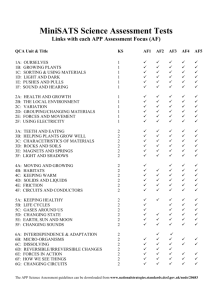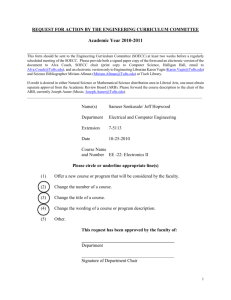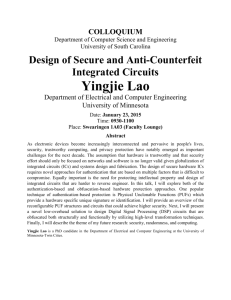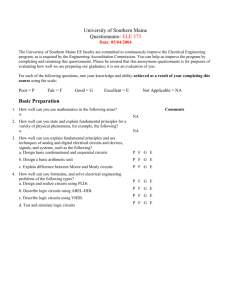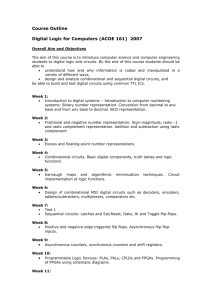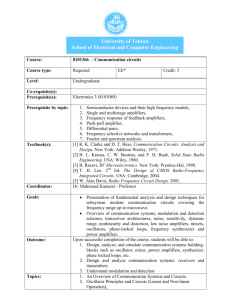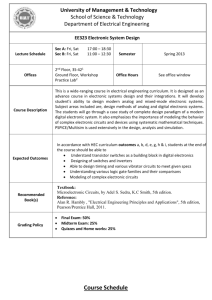EE-3EJ4 Electronic Devices and Circuits II
advertisement
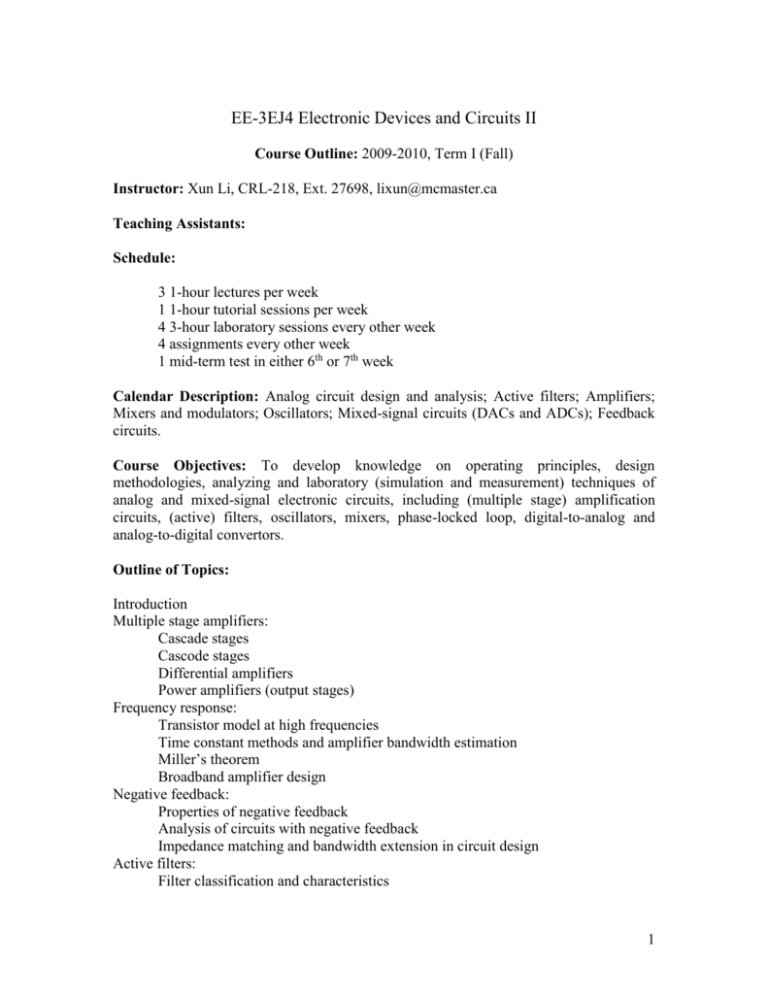
EE-3EJ4 Electronic Devices and Circuits II Course Outline: 2009-2010, Term I (Fall) Instructor: Xun Li, CRL-218, Ext. 27698, lixun@mcmaster.ca Teaching Assistants: Schedule: 3 1-hour lectures per week 1 1-hour tutorial sessions per week 4 3-hour laboratory sessions every other week 4 assignments every other week 1 mid-term test in either 6th or 7th week Calendar Description: Analog circuit design and analysis; Active filters; Amplifiers; Mixers and modulators; Oscillators; Mixed-signal circuits (DACs and ADCs); Feedback circuits. Course Objectives: To develop knowledge on operating principles, design methodologies, analyzing and laboratory (simulation and measurement) techniques of analog and mixed-signal electronic circuits, including (multiple stage) amplification circuits, (active) filters, oscillators, mixers, phase-locked loop, digital-to-analog and analog-to-digital convertors. Outline of Topics: Introduction Multiple stage amplifiers: Cascade stages Cascode stages Differential amplifiers Power amplifiers (output stages) Frequency response: Transistor model at high frequencies Time constant methods and amplifier bandwidth estimation Miller’s theorem Broadband amplifier design Negative feedback: Properties of negative feedback Analysis of circuits with negative feedback Impedance matching and bandwidth extension in circuit design Active filters: Filter classification and characteristics 1 Time and frequency domain response 1st and 2nd order active filters Filter design Oscillators: Properties of positive feedback Oscillation conditions Oscillator circuits Mixed-signal circuits: Digital-to-analog conversion circuits (DACs) Analog-to-digital conversion circuits (ADCs) Analog multiplication (mixer and modulation) circuits Phase-locked loop and amplitude-locked loop Switched capacitor Conversion interface circuits Format: Full class sessions (36 Hours): 3 Hours per week for 12 weeks Tutorial/Review sessions (10 Hours): 1 Hour per week for 10 weeks Laboratory sessions (12 Hours): 3 Hours every other week for 8 weeks Pre-lab preparations (8 Hours): 2 Hour every other week for 8 weeks Assignments (16 Hours): 4 Hours every other week for 8 weeks Study time (60 Hours): 5 Hours per week for 12 weeks Total loading: ~12 Hours/Week Assessment: Laboratory: 20% (4 labs, each laboratory has 5 points, total 20 points) Assignment: 16% (4 assignments, each assignment has 4 points, total 16 points) Mid-term test: 14% (2 questions, each has 7 points, total 14 points) Final exam: 50% (5 questions, each has 10 points, total 50 points) Calculator requirement for test and examination: McMaster standard calculator (Casio fx991). Resources: 1. Textbook 1: Fundamentals of Microelectronics, B. Razavi, John Wiley & Sons, ISBN-978047178461 2. Textbook 2: Microelectronic Circuit Design, R. C. Jaeger, McGraw-Hill, either edition 3. Reference book 1: Microelectronic Circuits, Sedra & Smith, Oxford University Press, ISBN-0195142519 4. Reference book 2: Advanced Electronic Circuit Design, Comer & Comer, John Wiley & Sons, ISBN-0471228281 2 Policy Reminders: The Faculty of Engineering is concerned with ensuring an environment that is free of all adverse discrimination. If there is a problem, that cannot be resolved by discussion among the persons concerned, individuals are reminded that they should contact the Department Chair, the Sexual Harassment Officer or the Human Rights Consultant, as soon as possible. Students are reminded that they should read and comply with the Statement on Academic Ethics and the Senate Resolutions on Academic Dishonesty as found in the Senate Policy Statements distributed at registration and available in the Senate Office. Academic dishonesty consists of misrepresentation by deception or by other fraudulent means and can result in serious consequences, e. g. the grade of zero on an assignment, loss of credit with a notation on the transcript (notation reads: "Grade of F assigned for academic dishonesty"), and/or suspension or expulsion from the university. It is your responsibility to understand what constitutes academic dishonesty. For information on the various kinds of academic dishonesty please refer to the Academic Integrity Policy, specifically Appendix 3, located at http://www.mcmaster.ca/senate/academic/ac_integrity.htm. The following illustrates only three forms of academic dishonesty: 1. Plagiarism, e. g. the submission of work that is not one's own or for which other credit has been obtained. 2. Improper collaboration in group work. 3. Copying or using unauthorized aids in tests and examinations. THE INSTRUCTOR RESERVES THE RIGHT TO CHOOSE THE FORMAT OF ANY DEFERRED MIDTERMS OR DEFERRED FINAL EXAMS (I.E. FORMAT MAY BE WRITTEN OR ORAL). 3
